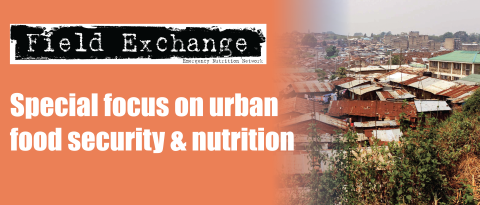Review of urban gardens programme for HIV-affected women and children
Summary of review1

A caretaker participating in the urban gardens programme
Food and livelihood insecurity is a long-term consequence of HIV, affecting the health, productivity, and asset stabilisation of families affected by the disease. Access to a reliable and safe food supply can be especially difficult for HIV-vulnerable populations in urban areas, where the means of food production are limited and where in many places food prices are increasing. Many interventions have been implemented to address this complex problem, but few have been well documented or evaluated.
Development Alternatives Inc. (DAI) has implemented a broad portfolio of economic-strengthening programmes designed to improve the health and livelihood outcomes of HIV-infected and -affected people, families, and communities, in terms of social, economic, nutritional, and household asset productivity. The Urban Gardens Programme for HIV-affected women and children (UGP) established 188 school gardens targeting a beneficiary group of orphans and vulnerable children (OVC) and 186 community group gardens targeting a beneficiary group of adult people living with HIV (PLHIV) in 23 urban centres across Ethiopia. The UGP was implemented in two phases: Phase I occurred from 2005 to the end of 2008, and Phase II from 2009 to the end of 2012.
More than 122,000 OVC and 10,000 PLHIV were directly affected by this programme and experienced improved food and income and a greater overall sense of well-being and empowerment. The programme also strengthened the capacity of local implementing partners (IPs) to deliver agronomic, nutrition, and marketing skills to these marginalised urban groups. The programme’s success was tied to strong linkages with governmental and organisational health services and the sustainability of local partner organisations.
The U.S. Agency for International Development (USAID) commissioned the Food and Nutrition Technical Assistance III Project (FANTA) to conduct a review of UGP. This review was carried out in collaboration with USAID country managers, former DAI/UGP area coordinators, local IPs and government counterparts, and the UGP project technical manager. It aimed to assess programme acceptability and ownership, evaluate outcomes (on economic, social, nutritional, behaviour, and health variables) and identify options for transitioning and sustaining the programme’s successful activities.
Review findings The UGP did excellent work in facilitating a dialogue on improved urban horticulture and its role in empowering PLHIV and improving food and economic security among vulnerable populations and key organisations in Ethiopia. A great many lessons have been learned through the creation of school and community group gardens, some of which are as follows.
The review indicates that, despite the results achieved during the programme’s operation, some school gardens ceased to function once the programme ended and stopped providing technical support. Although the drip irrigation supplies remained on site, they were not being used, and garden beds were drying up and reverting back to virgin land. The review also revealed a number of other flaws in terms of sustainability. The drip irrigation technology, while state of the art for medium-sized producers, was too large, too costly, and too difficult to repair or even maintain by school and adult group gardeners. Agronomically, UGP training did not place a strong enough emphasis on soil health development, water conservation with mulching, deep digging, plant spacing, or local soil amendments.
For school gardens to continue, it will be important to create curriculum-oriented garden classrooms, to focus on a new paradigm of ‘grow more with less’, to allocate a smaller land area for each student, and to provide adequate training in container gardening techniques. Furthermore, changing the time frame that students participate in the programme from September-June to January-December will allow them to be properly trained and mentored by outgoing participants, will give teachers adequate time to select student gardeners and to provide support for the start-up of new student gardening groups and will allow students to carry on the gardening activity for a full half-year after the rainy period (June-September).
Community group gardens were well established by UGP and are likely to continue to operate successfully without further interventions. Broader agronomic training, using the Urban Garden Dialogue method2 (UGP 2011b) and focusing on bio-intensive gardening, composting, and water conservation measures, would significantly enhance productivity outcomes. Drip irrigation systems are appropriate in some contexts and should be assessed on a garden-by-garden basis, with most gardens moving to simpler, more locally appropriate watering methods. The opportunity for further enhancement of economic and nutritional outcomes should be explored, with potential activities including a more involved market assessment, training on improved post-harvest handling, and cooking skills training, delivered by trained implementing partner (IP) extension staff.
Follow-on programmes that include high-quality, hands-on, dialogue-based, neighbourhood network-oriented training with local IPs could achieve significant reductions in extreme poverty, food insecurity, and childhood stunting. Moving forward, the focus must be on locally appropriate, small-scale, high-yield agricultural techniques that are best suited to meet urban challenges while taking advantage of the many market and population outreach opportunities that these areas present.
The full report is available at: http://www.fantaproject.org/publications/urban-gardens-review-2013.shtml
1Jensen, Peter. 2013. The Urban Gardens Programme for HIV-Affected Women and Children: A Review and Look to the Future. Washington, DC: FHI 360/FANTA.
2UGP. 2011b. Urban Garden Dialogue: Tools for Sustainable Urban Agriculture. Second Edition. Bethesda, Maryland: DAI.
Imported from FEX website


